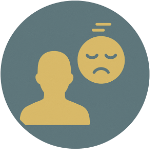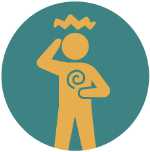Seeing the Whole Picture
Problem of Over-Specialization in Modern Medicine
When you visit a doctor today, you’re often seen by a specialist. Cardiologists for the heart. Gastroenterologists for digestion. Neurologists for the brain. Rheumatologists for the joints. This focused approach has led to incredible advances in targeted care. But it’s also created a strange problem: no one’s looking at the person as a whole.
For people with complex or chronic conditions, this can feel like being split into parts. You may have five doctors—each running their own tests, making their own decisions, and rarely communicating with one another. You may leave an appointment with a new prescription but no real explanation of how your fatigue, sleep, digestion, and mood are all connected.
This is where Traditional Chinese Medicine (TCM) offers something different: a view that starts with the complete system and works inward.
How Patients Can Connect
Both Worlds
Navigating both Western medicine and Traditional Chinese Medicine (TCM) doesn’t have to feel like choosing sides. Here are a few simple ways patients can help connect the dots:
🧾 Keep a health journal.
Write down symptoms, energy levels, sleep patterns, reactions to foods or medications, and emotional shifts. This helps both your MD and your TCM practitioner see patterns over time.
💊 Bring a list of medications and supplements.
Whether you’re seeing a TCM practitioner, nutritionist, or physical therapist, it helps to know what you’re already taking—prescriptions, herbs, or over-the-counter remedies.
🩺 Share what you’re trying—without apology.
If you’re seeing both a cardiologist and an acupuncturist, let them know. Most practitioners appreciate being informed, even if they don’t specialize in the other system.
📋 Ask for your records.
You’re allowed to have copies of your lab results, imaging, or visit summaries. Bring them to your TCM appointment if you think they’ll help—but it’s also okay if you just bring your story.
🤝 Find practitioners who are open-minded.
You don’t need every provider to understand everything about both systems—but it helps when they’re willing to communicate and respect your choices.
✨ Trust that your experience matters.
Even if a test is “normal,” your symptoms are real. Complementary care works best when you show up as a full person—not just a diagnosis.
When the Body Gets Divided
The modern medical system has become highly specialized out of necessity. The human body is complex, and advanced care requires focused training. But the trade-off is that the body is now seen as a collection of parts and concerns. Heartburn is for one office, insomnia for another, joint pain for a third—even when these symptoms may all stem from the same root imbalance.
Patients often feel like messengers, carrying information from one doctor to another, hoping someone will see the bigger picture. And with shorter appointment times and insurance-driven protocols, even the most compassionate physicians struggle to step back and ask: How does it all fit together?
This wasn’t always the case. Many people remember when a family doctor knew your name, your history, and your parents’ health. That doctor may not have had all the tools of today, but they had something just as valuable: context.
TCM Starts with the Pattern
In TCM, symptoms are not seen in isolation. Instead, they form a pattern—a reflection of how the body’s systems are interacting. A TCM practitioner doesn’t treat knee pain without asking about digestion, sleep, emotions, and energy. They don’t separate the physical from the mental. If your stomach hurts only when you’re under stress, that matters. If your shoulder pain flares when you’re exhausted, that matters too.
By stepping back to observe how symptoms move together, TCM practitioners identify underlying imbalances—whether in Qi, blood, fluids, or organ systems. Treatment is then tailored to you, not just your diagnosis.
It’s not faster, but it’s often more satisfying. Patients feel heard. Patterns make sense. And small, unexpected improvements (like better sleep or calmer mood) are seen as signs that deeper balance is returning.
Why This Matters in Chronic Care
For patients dealing with conditions like IBS, arthritis, diabetes, or chronic fatigue, over-specialization can lead to fragmented, conflicting care. Each doctor may have a piece of the puzzle, but no one’s assembling it. Medications may pile up. Side effects go unaddressed. Emotional well-being is rarely part of the plan.
In TCM, even when the focus is on one primary concern, care always includes the surrounding system. That’s why someone receiving acupuncture for headaches may also find that their digestion improves, or that mood becomes more stable. The body isn’t treated in parts. It’s seen as a moving, interacting whole.
Two Systems, One Patient
This isn’t a rejection of specialists. TCM doesn’t replace surgery or diagnostics or urgent care. But it reminds us of something Western medicine sometimes forgets: the human body is a system, not a stack of files.
When patients are allowed to be whole persons again—when one practitioner connects the dots, listens to their story, and responds to the entire pattern—they often begin to heal in ways that don’t show up on a chart.





